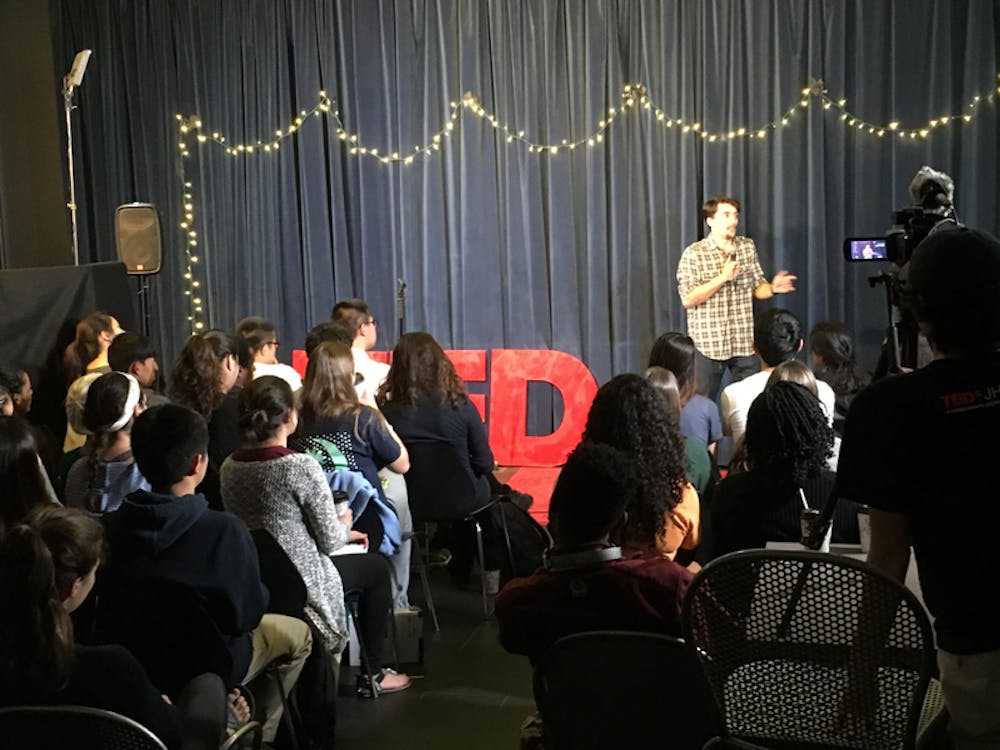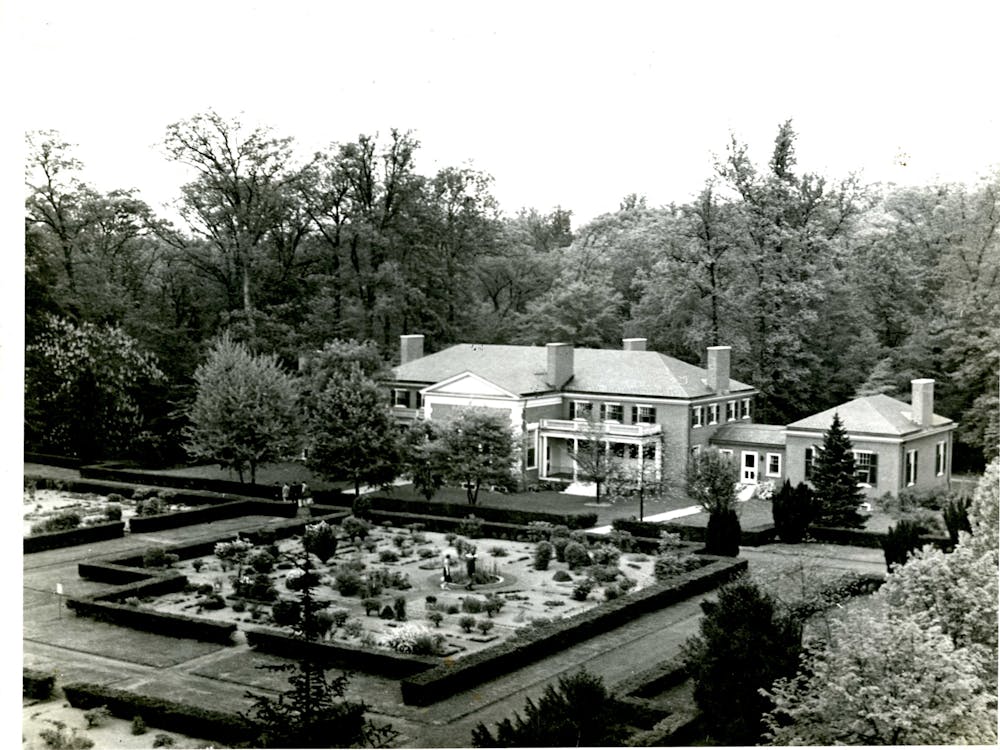TEDxJHU, a student-run organization modeled after the TEDx conferences, held a salon event on Nov. 3 in Bamboo Café.
The event, titled “What They Didn’t Tell You at Orientation,” was geared toward freshmen and featured three senior speakers, Dylan Alvarez, Nadeem Bandealy and Tiffany Onyejiaka, as well as performances by the Octopodes.
Sophomore Victor Evangelista, an event organizer and TEDxJHU member, discussed the process involved with putting on the event.
“It took a good amount of planning,” Evangelista said. “[The speakers for tonight] were nominated by our team members, so from there we get our nominations and as a group we decide who we think is most qualified, what they propose they want to speak on, [and] what’s relatable to the current events.”
The event was well-received by attendees such as freshman Christina Lane.
“I really loved the last speaker, Tiffany,” said Lane. “She made me want to get out there and do something and be an activist.”
TEDxJHU is currently gearing up for their biggest event on March 11.
“[The March 11th event] is our main event, and what we’re most excited for,” said Evangelista. “It usually focuses around Baltimore and Washington, D.C. politicians or public figures that come from a variety of different fields, like public health, business, entrepreneurship.”
Dylan Alvarez:
Getting Outside
Dylan Alvarez, a native Floridian, emphasized the importance of exploring outside and breaking out of one’s routine. Homeschooled for many years, Alvarez was surrounded by three different national parks during his adolescence. As a result, he became attuned to nature and having hands-on experiences.
He credited this unconventional upbringing with allowing him more freedom and creativity instead of being confined to the limitations of a traditional classroom and its standards of learning. He stressed the dangers of modern-day overreliance on social media and information flow.
“While the standardized school system carries some fault for [the] unimaginative approach to learning, I think that 21st century social media carries some blame that is just as constraining,” Alvarez said. “Our generation is fixated on this information flow to try to stay sane. It’s insane. This influx of information creates mental habits that we find comforting, so we become comfortable in this pattern of desensitization from emotions and wonder. Habituation is a distraction from the desensitization.”
Alvarez further emphasized the tendency for people to settle into a comfortable routine and their reluctance to get out of it.
“[It’s] something psychologists call hedonic adaptation. This pattern of neurological response to the same stimuli in our heads, only temporarily spiked before going back to a state of neutrality,” Alvarez said. “This becomes our comfort zone, a treadmill without an off switch.”
To combat and cure this hedonic adaptation, Alvarez highlighted the importance of going outside and spending time in nature.
“I think that getting outside is the best way to break up that monotony, our mental capacity to hold it in, to turn off the hedonic adaption, by immersing ourselves in the simplicity and basic admiration of the outdoors,” said Alvarez. “Passionate emotion is key to passionate moments. Get out and move. Get your hands dirty and hold onto that youthful energy. Whatever activity it is, those moments of unbearable, passionate reverie, those moments that keep us alive and enraptured and focused. That’s enough to keep us uphill of the hedonic treadmill.”
Nadeem Bandealy:
Facing Uncertainty
As a freshman, Bandealy wanted to become an investment banker. However, he found himself venturing into new and untried paths throughout his college years before finally deciding to pursue public health. In his talk, Bandealy focused on the feeling of uncertainty as he struggled to find a career path that was the right fit for him, emphasizing the way students can actually capitalize on their doubts.
“I didn’t plan on coming [to Hopkins] and within a few weeks, changing my entire career. It wasn’t in the four-year plan, but that’s what ended up happening,” Bandealy said. “For the first time in my life, I was really uncertain about what the next step was going to be. It seemed like everyone’s got it all figured out, and I honestly thought I was the only one who didn’t. This feeling of loss festered inside me, and it grew. I felt completely buried in uncertainty, and I didn’t know who was going to pull me out.”
However, Bandealy reaffirmed that this feeling of uncertainty and loss should not be feared. He emphasized that it is a normal part of life, and a stepping stone in the path to finding ourselves.
“The thing with uncertainty is... it’s a normal, natural part of life. It’s going to keep happening to you, again and again and again,” he said. “I argue that it’s a good thing, because it forces you to sit down, and really think about who you are, and who you want to be.”
Taking action, Bandealy argued, was the only way to overcome the fear of uncertainty and to move forward.
“If we want to overcome this [fear], we just need to dive headfirst into the uncertainty. Uncertainty is ironic because it freezes us. It makes us feel stuck. It prevents us from being able to think, from being able to act,” Bandealy said. “But the funny thing about it is that the only way to get out of that pattern is to actually get off the couch and go do something.”
“We need to recognize our fears and reservations and overcome them. Because it’s not about that uncertain, sinking feeling you get in your stomach, and it’s not about that uneasiness you get when you think about what the future might hold. It’s about what you do next.”
Tiffany Onyejiaka:
Becoming an Activist
Tiffany Onyejiaka closed the event with a talk centered around being an activist and fighting for social justice. Onyejiaka began with an anecdote of her kindergarten self, adamantly seeking the justice she deserved if another child had done her wrong. Yet, Onyejiaka said, with maturity and age came an increased passivity and tolerance for injustice.
“There is not a day in kindergarten that I was not complaining about some perceived injustice that I thought I was getting,” Onyejiaka said. “We are all born with such as strong sense of justice. But as time progresses, society begins to unravel our desire for equity. Suddenly, when we get disrespected, instead of being that kid stomping and asking for justice, we become the other kid, the one sitting in the corner, being silent, counting the minutes until a parent picks them up.”
Onyejiaka’s hometown was radically different from Hopkins, and she lived in a much more liberal and progressive environment. She shared her first direct encounter with racism at Hopkins, as well as the feeling of misplacement, even going so far as to consider transferring to another school during the fall semester of her freshman year.
“Coming to Hopkins was a culture shock because it was one of the first times I realized that I was going to face racism [and] sexism here, and I was going to learn how to deal with it,” Onyejiaka said. “One of the most jarring episodes of my life was freshman year. This boy in my dorm posted on Facebook that he thought black girls were ugly. My first instinct was that he had been hacked. I couldn’t believe that someone who lived just a couple doors away from me could spew something so hateful.”
In an attempt to instigate change within the Hopkins community, Onyejiaka spoke about joining the Black Students Union (BSU) and taking classes with Floyd Hayes, a senior lecturer and coordinator of programs and undergraduate studies in the Center for Africana Studies.
“Sophomore year, I joined the executive board of Black Students Union, and it taught me that if someone is doing something indirectly or directly that affects you, it doesn’t matter what their pay rate is, what their role is, where they come from; You can tell them what they’re doing is wrong. And I learned if you make your voice large enough, people will listen,” Onyejiaka said.
“Something [Dr. Hayes] always trusted to us is the power that college students have. There are so many structures in our institutions that would not be here if our predecessors hadn’t paved the way to that,” Onyejiaka continued. “If enough of you guys banded together and said to administration ‘this is what we want,’ things could actually happen, and I think that’s a power that a lot of us forget we have but we all do retain.”
Onyejiaka defined activism as the pursuit of, and the fight for, the respect that every human being deserves.
“I think the core aspect of [activism] is the realization that if you are breathing, you are a human being, and that you deserve respect in every aspect of your life,” she said. “That means that no one ever has the right to put limitations on your achievements. No one has the right to ever invalidate aspects of your identity. If something upsets you, you cannot accept the status quo. You cannot be apathetic... It’s okay to love yourself so much you will not accept any disrespect for yourself, or a community you belong to. That’s a really beautiful thing to have.”























Please note All comments are eligible for publication in The News-Letter.